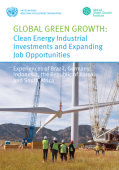Climate change is expected to increase risks to businesses, infrastructure, assets and economies. Understanding how to involve the private sector in responding to these risks – or encouraging them to take advantage of the new business opportunities that may arise from changing climate conditions – is crucial to catalyze greater investment in activities that increase countries, businesses, and communities’ resilience.
This report includes illustrative case studies on the Obama Administration’s efforts in a number of key countries—Chile, Costa Rica, Dominican Republic, El Salvador, Guatemala, Honduras, Nicaragua, Morocco, Oman, and Peru—in which USTR and the U.S. Department of State have had intensive engagement on environmental issues in recent years. Presenting unique opportunities and challenges, each country has required a tailored approach. Its objective in each, however, has been the same—to ensure that increased trade goes hand in hand with increased environmental protection.
The perceived potential of clean energy to support employment in the post-crisis recovery context has led several OECD and emerging economies to design green industrial policies aimed at protecting domestic manufacturers, notably through local-content requirements (LCRs). These typically require solar or wind developers to source a specific share of jobs, components or costs locally. Such requirements have been designed or implemented in the solar- and wind-energy sectors in at least 21 countries, including 16 OECD countries and emerging economies, mostly since 2009.
Empirical evidence gathered in this report shows however that LCRs have actually hindered international investment across the solar PV and wind-energy value chains, by increasing the cost of inputs for downstream activities. This report also takes stock of other measures that can restrict international investment in solar PV and wind energy, such as trade remedies and technical barriers. This report provides policy makers with evidence-based analysis to guide their decisions in designing clean-energy support policies.
This report focuses on the employment generation opportunities of measures to reduce carbon dioxide emissions through investments in renewable energy and energy efficiency, and reviews some of the main considerations with respect to advancing effective industrial policies. The report concludes that if most countries devote about 1.5 percent of their economy’s GDP to such investments each year, it will be possible for the global economy to meet the IPCC’s 20-year intermediate emission reduction target, while also enjoying energy security for supporting sustainable growth rates.
It also shows that there are clear net-gains in employment generation in shifting from conventional energy sources to renewable energy sources and enhancing energy efficiency. These gains have wider societal implications, as decent job opportunities are likely to open up for people in the informal sector with low educational attainment levels. Targeted industrial policies will need to help these groups realize such opportunities as well as providing the training and skill acquisition needed for other positions created through green investments.

This report examines the specific industrial policy measures promoting a low-carbon transition in five focus countries, specifically Brazil, Germany, Indonesia, the Republic of Korea and South Africa, through a compilation of expert review studies. It shows that across all levels of development, major attention is being paid to the threats of climate change and opportunities of pursuing a low-carbon development path, and dedicated efforts are presented to operate efficient industrial policies to enhance green growth. However, it is clear that the major focus in developing countries will need to be on green investments and on creating an enabling environment for such investments if the global economy is to effectively combat climate change.
This report is the second volume in a two volume set. Volume I of the report, providing overall findings from the project, can be accessed here.
